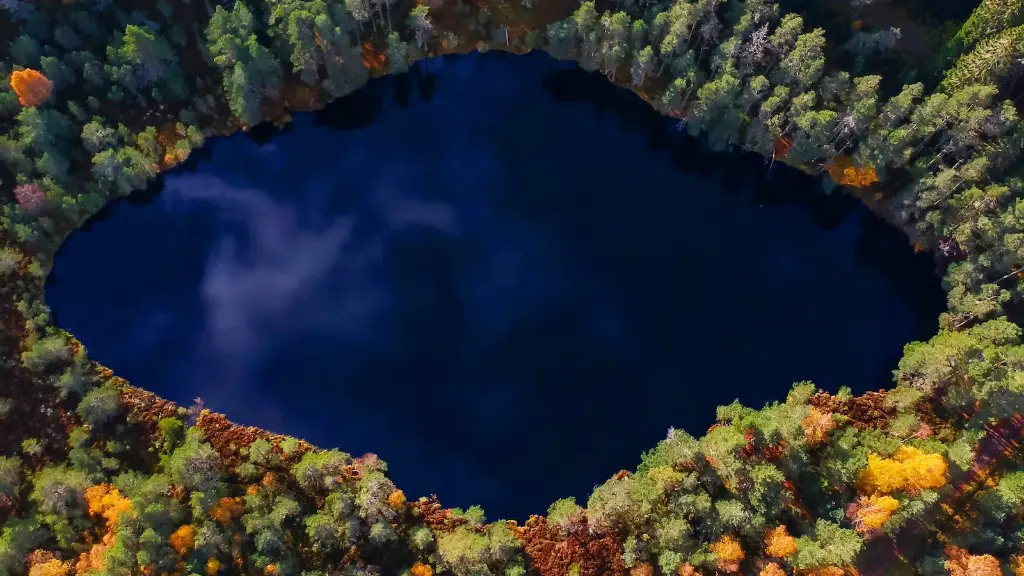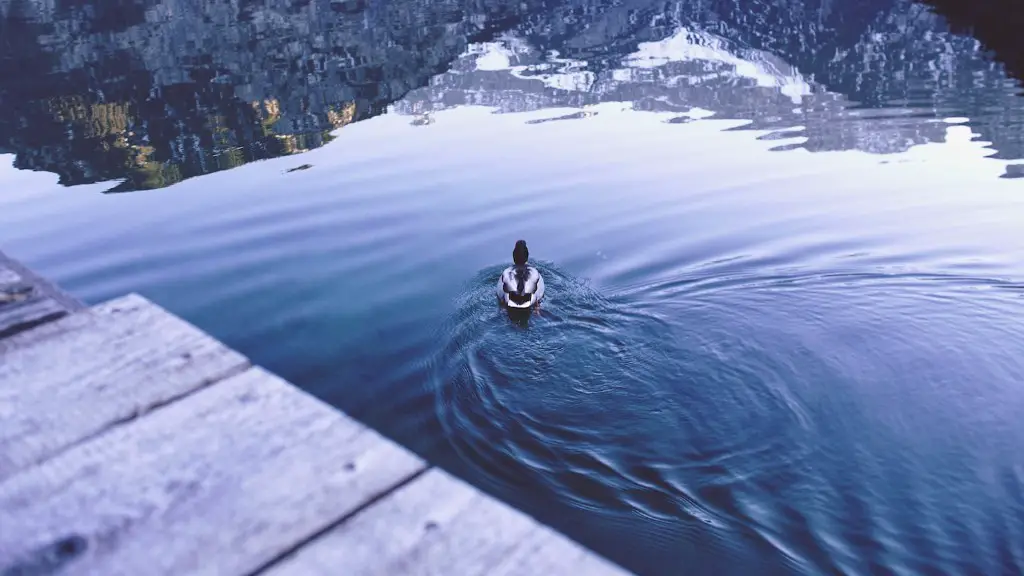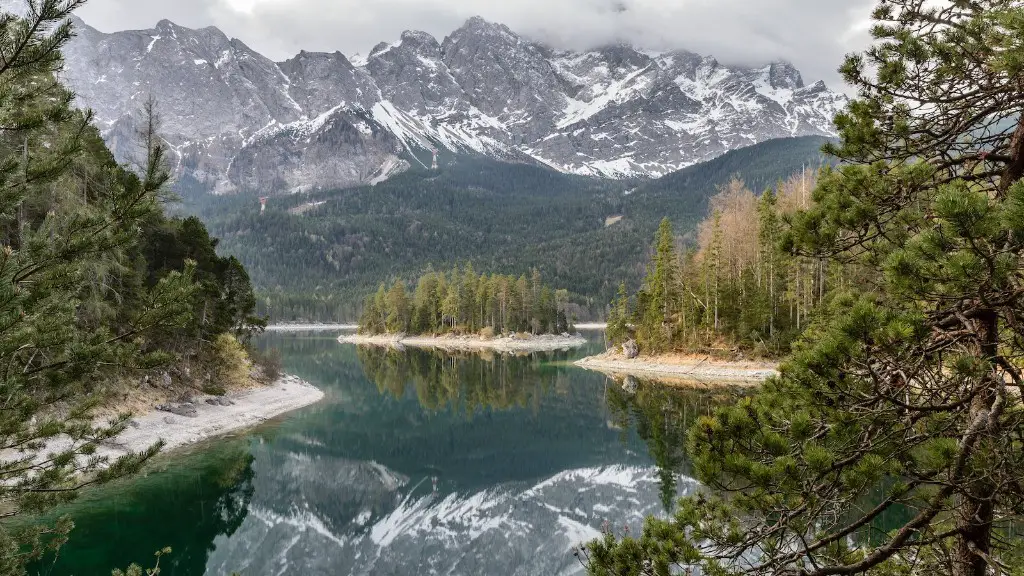Introduction
Lake Baikal is the oldest and deepest lake in the world and is located in Siberia Russia. It is often referred to as the “blue eye of Siberia” due to its unique qualities. Its deep blue colored water is extremely clear, making it an impressive sight for anyone who visits it. It is home to wildlife such as seals, freshwater shrimp, and more than 1,500 varieties of plants. Its unique temperature, environment, and plant and animal diversity make it one of the most unique, pure and beautiful natural environments on the planet.
Unique Qualities
Lake Baikal is known for its exceptional clarity, which is so extraordinary that the average visibility of its depths can exceed 40 meters in some places. The main reason for its clearness is the low concentration of organic matter in the water, along with the absence of soil or suspended material that blocks the light. This means that the sun can easily penetrate the body of water, making this lake incredibly blue.
The depth of Lake Baikal is also impressive, with a maximum depth of 1,741 meters. In addition, it is the largest freshwater lake in the world by volume, containing around 20% of the total freshwater reserves of the planet, most of which is still unexplored.
Conservation
Conservation is an important element for the preservation of this lake and its surrounding environment. Lake Baikal is a UNESCO World Heritage Site and is currently protected by the Baikal Nature Reserve and the regular monitoring of the lake’s health. Various initiatives have also been put in place to ensure the correct use and management of the lake, including the introduction of a plastic bag ban and a regulation surrounding the use of motorboats.
Additionally, environmental groups have also been working hard to protect Lake Baikal and have conducted scientific studies in order to understand the importance of the lake and to help with the protection and preservation of its unique environment.
Cultural Significance
Lake Baikal is more than just a beautiful body of water; it also has an important cultural significance for the local people and the whole of Russia. The lake has been seen as a sacred site for thousands of years by the Buryat people, and to this day it is seen as a spiritual home by many who travel to it in search of peace, solace and inspiration.
The lake is also a popular tourist destination, with people travelling to witness its beauty firsthand. Every year, millions of people visit the lake to experience its sights, sounds and wildlife. The lake is also popular among wildlife photographers, as the region’s biodiversity is incredibly rich.
Environmental Effects of Climate Change
Climate change is having a huge effect on Lake Baikal and the surrounding environment, leading to significant changes in the lake’s temperature, ecosystems, water quality and more. Many experts believe that the region is in danger of being destroyed due to the effects of global warming, with an increase in the water temperature leading to an increase in the growth of poisonous algae, an increase in the erosion of the lake’s shores, and an overall decrease in the clarity and health of the lake as a whole.
In response to these changes, environmental groups have once again stepped up to help protect Lake Baikal. Initiatives such as the Baikal Climate Fund have been set up to help increase public awareness and to incentivize individuals and businesses to reduce their carbon footprint and to work towards sustainability in the region.
Pollution
Pollution is also a major problem in this region, with many industrial activities taking place in the area. Pollution of Lake Baikal is mainly caused by untreated wastewater and other pollutants entering the lake, resulting in the depletion of oxygen and the growth of dangerous algae blooms.
In order to help protect the lake from pollution, environmental groups have set up a number of initiatives. These include the creation of special protection zones, increased control over illegal fishing, and the implementation of waste management strategies.
Economic Benefits
Lake Baikal provides significant economic benefits to the country, both directly and indirectly. Tourism to the area has increased significantly in recent years, attracting visitors from all over the world. This influx of tourists has led to a huge increase in economic activity, which has helped the local communities and businesses that rely on the lake.
The lake is also a hugely important source of drinking water, containing some of the purest and cleanest water in the world. This has allowed the local communities to access water of a much higher quality than most, as well as saving them money on their water consumption.
Unique Marine Life
In addition to its unique ecosystem, Lake Baikal is also home to some of the most unique marine life on the planet. The lake is home to over 1,500 species of animal, including the baikal omul and the Baikal seal, which is endemic to the lake. This impressive biodiversity combined with its unique physical characteristics means that Lake Baikal is an incredibly special environment, deserving of its nickname as the “blue eye of Siberia”.
Impact on Climate and Weather
The lake has a major effect on the climate in the region, particularly the weather patterns. This is largely because of the lake’s large size and its location, which is on the intersection of several climatic zones.
The lake can act as a heat regulator, absorbing sunlight during the hottest months of the year and keeping temperatures low in the winter. This has a major effect on the surrounding weather and helps to create much milder cold seasons than seen in most other places in Siberia.
Conclusion of Lake Baikal’s Impact
Lake Baikal is one of the most important and beautiful bodies of water on our planet and its nickname of the “blue eye of Siberia” is well deserved. Its unique qualities have a major impact on the environment, from the clarity of its depths to its effect on the climate and its wildlife. In order for this beautiful lake to remain healthy and protect its unique environment, it is important that we continue to protect and conserve it, as well as work to reduce and limit the damage caused by human activities.


